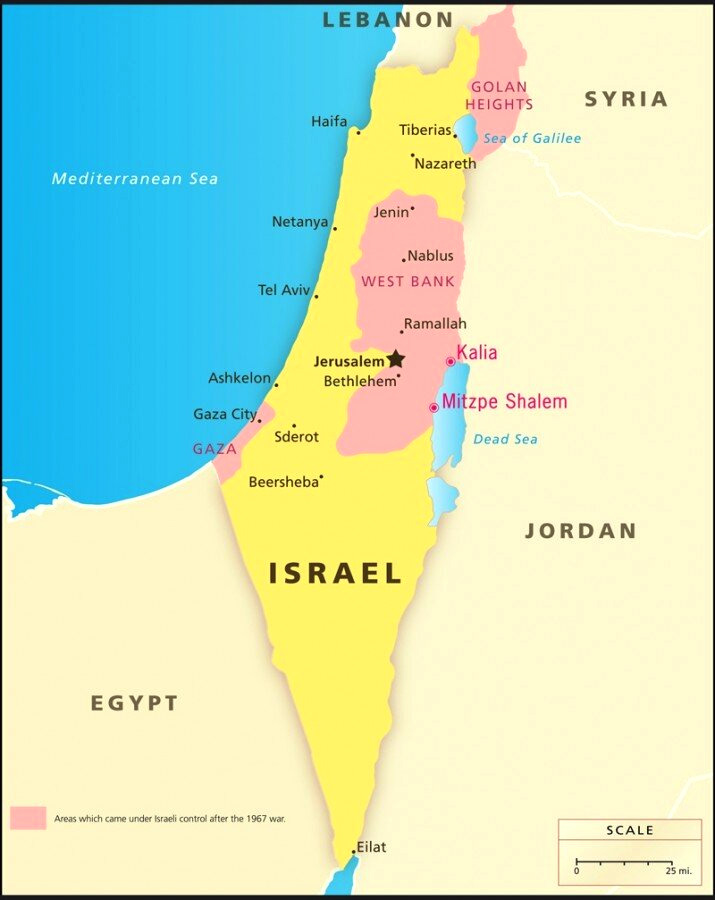International Relations
Elusive Two-State Solution
- 24 Feb 2021
- 6 min read
This article is based on “Dialogue not demonisation” which was published in The Indian Express on 24/02/2021. It talks about the prospects of the two-state solution between Israel and Palestine.
Recently, the International Criminal Court (ICC) issued a decision regarding the scope of its territorial jurisdiction over issues pertaining to the Israeli-Palestinian conflict. According to this, ICC has agreed to look into the human right violations that occurred during the Israel-Palestine issue.
Palestinian Authority has welcomed this decision. On the other hand, Israel has criticized the ICC action as an unwarranted intervention that undermines its sovereignty and threatened that the move may eventually eliminate the possibility of a two-state solution.
Presently, the Israeli-Palestinian conflict is marked by a relatively low-intensity conflict, with recurring spikes in violence, and the continual erosion of political options. This dangerous status quo could directly impact sustainable peace and drag the region into instability.
What is a Two-State Solution?
- The two-state solution has for decades been the primary focus of efforts to achieve peace in the Israeli-Palestinian conflict.
- The solution would establish an independent Palestinian state alongside Israel — two states for two peoples.
- In theory, this would win Israel’s security and allow it to retain a Jewish demographic majority while granting the Palestinians a state.
- The 1947 UN Partition Plan led to decades of military action and violence between Israel and Palestine. It is was only after the mediation of the US, in the 1991 Madrid Peace conference a two-state solution was agreed to resolve the Israeli-Palestinian conflict.
- According to the United Nations, only a two-state solution that realizes the legitimate national aspirations of Palestinians and Israelis can lead to sustainable peace.
Risk to Two-State Solution
- Iranian Angle: Tensions and risk factors persist along Israel’s northern fronts, particularly after the Israeli strikes in Syria against Iranian and Hezbollah targets (associated with Palestine) and more recently the killing of Iranian commander Qassem Soleimani by the U.S.
- Regional Cold War: Middle East region is witnessing a regional cold war between Iran and Saudi Arabia. This has led to the emergence of smaller but lethal military groups.
- For Example, Houthi rebels in Yemen. These groups can acquire greater capabilities which can cause further instability in the region.
- All of these factors exacerbate instability and the prospect of a single or even a multi-front war.
- Third Intifada: Finally, these conditions could result in the outbreak of a third intifada, and peaceful resistance can turn into extreme violence and gross human rights violations.
- Divided Political Leadership In Palestine: The Palestinian leadership is divided - a two-state solution is supported by Palestinian nationalists in West Bank but the leadership in Gaza does not even recognize Israel.
Intifada
- Intifada is the two popular uprisings of Palestinians in the West Bank and Gaza Strip aimed at ending Israel’s occupation of those territories and creating an independent Palestinian state.
- The first intifada began in December 1987 and ended in September 1993 with the signing of the first Oslo Accords, which provided a framework for peace negotiations between Israel and the Palestinians.
- The second intifada, sometimes called the Al-Aqṣā intifada, began in September 2000.
- The two uprisings resulted in the death of more than 5,000 Palestinians and some 1,400 Israelis.
Way Forward
- Role of India: Historically, India has urged the leadership of both sides to engage in direct negotiations to advance the goal of a two-state solution.
- In Palestine, India’s efforts are focused on nation-building and strengthening institutions through the India-Palestine development partnership covering various sectors of the Palestinian economy.
- With Israel, India shares a special relationship in the domains of defense, Science & Tech, etc.
- In this context, India can leverage its soft power to propel these two countries towards lasting peace.
- Abraham Accords, a Positive Step: The recent normalization agreements between Israel and the UAE, Bahrain, Sudan, and Morocco, known as the Abraham Accords, are further proof that the only way to achieve genuine peace is through direct negotiations.
- All regional powers should envisage peace between the two countries on line of Abraham Accords.
Conclusion
The world at large needs to come together for a peaceful solution but the reluctance of the Israeli government and other involved parties has aggravated the issue more. Thus a balanced approach towards the Israel-Palestine issue would help to maintain favorable relations with Arab countries as well as Israel.
|
Drishti Mains Question Discuss the prospects of the two-state solution between Israel and Palestine and its impact. |
This editorial is based on “By diligence, not lockdowns” published in The Economic Times on February 22nd, 2020. Now watch this on our Youtube channel.







